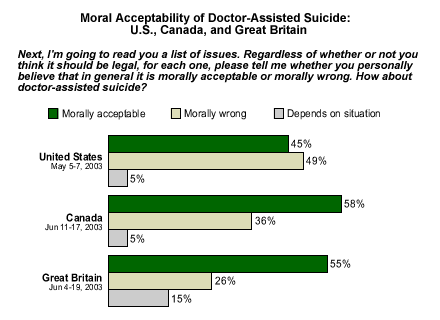Although some physicians question the modern-day relevancy of some of the tenets of the ancient Hippocratic oath, one truth is inescapable: medicine is a moral endeavor. Physicians all deal in life and death, which often places them at the heart of medical and moral debates. And doctor-assisted suicide is among the most contentious issues that physicians around the world face.
Earlier this year*, Gallup asked Americans, Britons, and Canadians whether they find doctor-assisted suicide morally acceptable or morally wrong. Ironically, in the only nation of the three in which assisted suicide is legal -- it is legal in the U.S. state of Oregon -- respondents are significantly less likely than those in the other two countries to find the issue morally acceptable. Forty-five percent of Americans said that doctor-assisted suicide is morally acceptable, compared with 58% of Canadians and 55% of Britons.

American opinion on the morality of this issue is more split than in the other two countries. Forty-nine percent of Americans find doctor-assisted suicide morally wrong, while 36% of Canadians and 26% of Britons share this point of view. Britons are more likely than Americans or Canadians, however, to hinge the moral acceptability of doctor-assisted suicide on the situation: 15% of British respondents volunteered the response of "depends on the situation" rather than choosing one answer or the other. Only 5% of Americans and Canadians offer this response.
An "assisted dying" bill set forth in the House of Lords in Great Britain may have been on the minds of some Britons who responded to this question. The proposed bill would legalize assisted suicide, but only under strict conditions and only in cases in which there is unbearable suffering from a terminal or incurable disease. The bill cleared its first hurdle in the House of Lords in June and may be proposed before Parliament.
Morality of Suicide
At the crux of the doctor-assisted suicide debate is overall opinion on the morality of ending one's own life. However, majorities of Americans, Canadians, and Britons all believe that suicide per se is morally wrong. Large majorities of Americans (81%) and Canadians (73%) say suicide is morally wrong, while a smaller majority of Britons (53%) feel that way. One possible explanation for these differences may be that doctor-assisted suicides may be seen as merciful and physician involvement in the process implies some measure of propriety.
Bottom Line
Although major medical associations in the United States, Great Britain, and Canada do not support doctor-assisted suicide, and it is against the law in almost every nation in the world, the tide of public opinion may be turning in some areas. The practice is now legal in several European nations. If this trend continues, more physicians around the world may find themselves facing this difficult ethical dilemma, not in theory, but in their practices.
*Results in the United States are based on telephone interviews with 1,005 national adults, aged 18 and older, conducted May 5-7, 2003. For results based on the total sample of national adults, one can say with 95% confidence that the maximum margin of sampling error is ±3 percentage points.
Results in Canada are based telephone interviews with 1,001 national adults, aged 18 and older, conducted June 11-17, 2003. For results based on the total sample of national adults, one can say with 95% confidence that the maximum margin of sampling error is ±3 percentage points.
Results in Great Britain are based telephone interviews with 1,009 national adults, aged 18 and older, conducted June 4-19, 2003. For results based on the total sample of national adults, one can say with 95% confidence that the maximum margin of sampling error is ±5 percentage points.
Results for the Canada and Great Britain surveys may not equal 100% due to rounding error.
In addition to sampling error, question wording and practical difficulties in conducting surveys can introduce error or bias into the findings of public opinion polls.